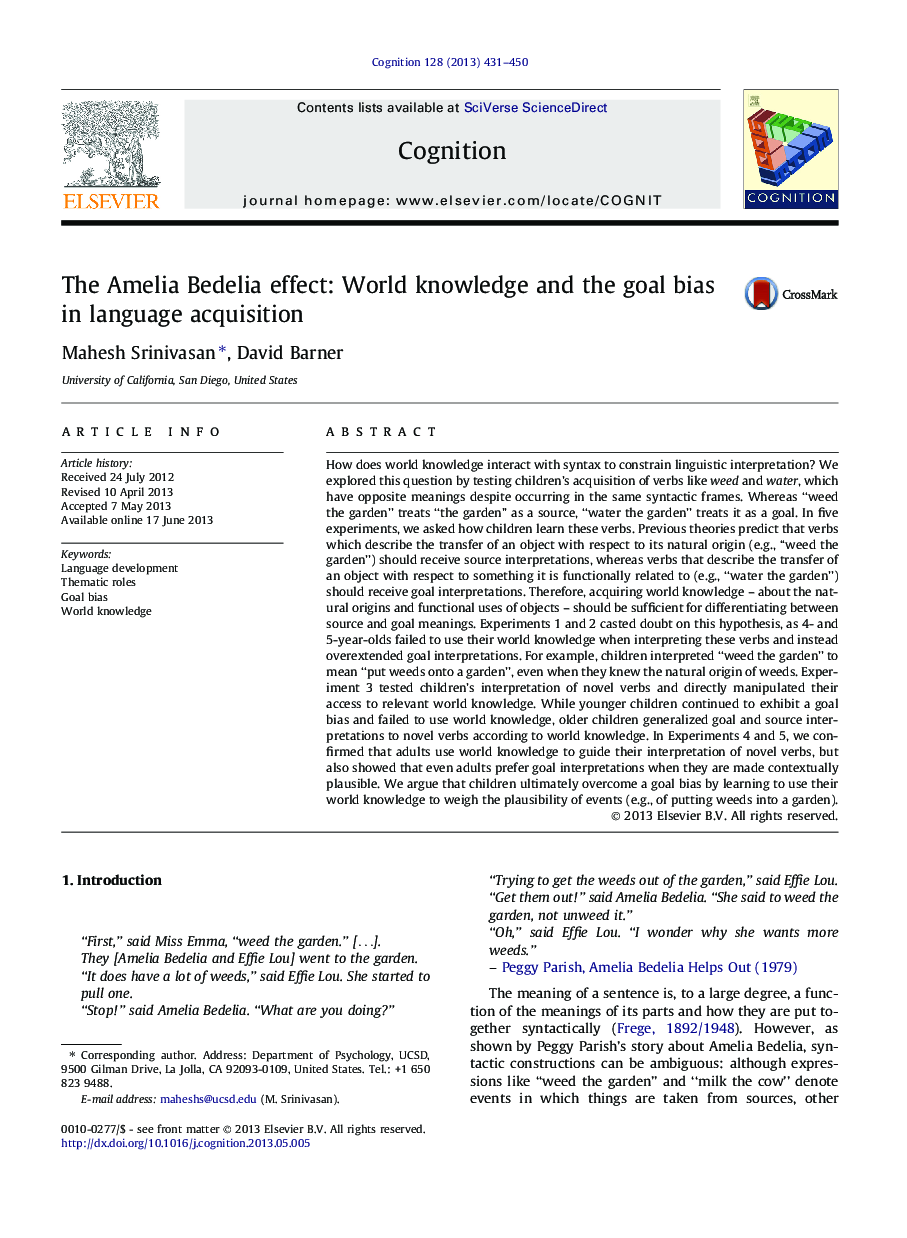| کد مقاله | کد نشریه | سال انتشار | مقاله انگلیسی | نسخه تمام متن |
|---|---|---|---|---|
| 10457624 | 921853 | 2013 | 20 صفحه PDF | دانلود رایگان |
عنوان انگلیسی مقاله ISI
The Amelia Bedelia effect: World knowledge and the goal bias in language acquisition
ترجمه فارسی عنوان
اثر آملیا بدلیا: دانش جهانی و تعصب هدف در کسب زبان
دانلود مقاله + سفارش ترجمه
دانلود مقاله ISI انگلیسی
رایگان برای ایرانیان
کلمات کلیدی
توسعه زبان، نقش های موضوعی، تعصب هدف، دانش جهانی،
موضوعات مرتبط
علوم زیستی و بیوفناوری
علم عصب شناسی
علوم اعصاب شناختی
چکیده انگلیسی
How does world knowledge interact with syntax to constrain linguistic interpretation? We explored this question by testing children's acquisition of verbs like weed and water, which have opposite meanings despite occurring in the same syntactic frames. Whereas “weed the garden” treats “the garden” as a source, “water the garden” treats it as a goal. In five experiments, we asked how children learn these verbs. Previous theories predict that verbs which describe the transfer of an object with respect to its natural origin (e.g., “weed the garden”) should receive source interpretations, whereas verbs that describe the transfer of an object with respect to something it is functionally related to (e.g., “water the garden”) should receive goal interpretations. Therefore, acquiring world knowledge - about the natural origins and functional uses of objects - should be sufficient for differentiating between source and goal meanings. Experiments 1 and 2 casted doubt on this hypothesis, as 4- and 5-year-olds failed to use their world knowledge when interpreting these verbs and instead overextended goal interpretations. For example, children interpreted “weed the garden” to mean “put weeds onto a garden”, even when they knew the natural origin of weeds. Experiment 3 tested children's interpretation of novel verbs and directly manipulated their access to relevant world knowledge. While younger children continued to exhibit a goal bias and failed to use world knowledge, older children generalized goal and source interpretations to novel verbs according to world knowledge. In Experiments 4 and 5, we confirmed that adults use world knowledge to guide their interpretation of novel verbs, but also showed that even adults prefer goal interpretations when they are made contextually plausible. We argue that children ultimately overcome a goal bias by learning to use their world knowledge to weigh the plausibility of events (e.g., of putting weeds into a garden).
ناشر
Database: Elsevier - ScienceDirect (ساینس دایرکت)
Journal: Cognition - Volume 128, Issue 3, September 2013, Pages 431-450
Journal: Cognition - Volume 128, Issue 3, September 2013, Pages 431-450
نویسندگان
Mahesh Srinivasan, David Barner,
